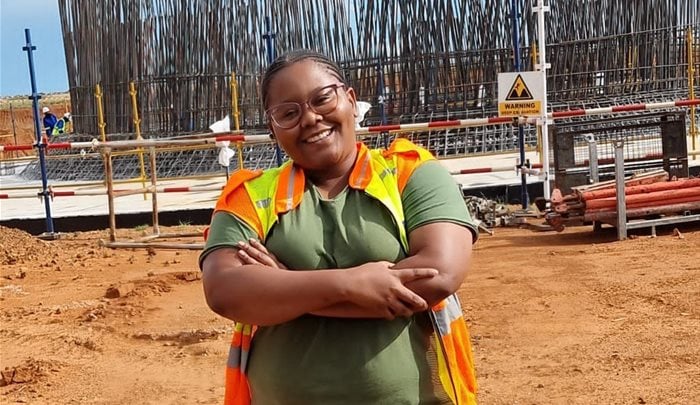
As a qualified quantity surveyor, she spent seven years working in the energy and mining space, but, partly due to the frustrations she faced as a woman in a male-dominated industry, Sebone decided to start her own company so that she could start to do things differently.
Following an initial unsuccessful partnership, she decided to go at it alone. While her previous work experience meant she already had invaluable industry knowledge, she gained basic administration and marketing skills through independent research and study.
Sebone won her first tender in 2019 - a small kitchen facility for a primary school in a local disadvantaged community - and has since gone on to complete numerous mining, roads and earthworks projects, as well as a major solar tower project in the Northern Cape.
Sebone shared some of the challenges women-owned construction enterprises face when trying to build a sustainable business.
She highlighted research from the Construction Industry Development Board (CIDB) which noted that in 2019, 48% of South Africa's construction enterprises were owned by women. "Although this percentage may be satisfactory, considering the history of our country, these woman-owned enterprises show low if not lack of growth," Sebone said.
Another study, Women-owned construction enterprises: A South African assessment, found that of the respondents surveyed, "most woman-owned contractors were not involved in the management functions necessary to operate construction businesses effectively".
"It is plausible that this finding is a consequence of almost all of them having little or no formal construction and building qualifications," it said.
The study also found that, "the under-representation of women in the higher grades of the CIDB was due to a lack of integrated career-focused training programmes aligned to the needs of women entrepreneurs at various levels of their development and flexible enough to allow for their dual roles as mothers and businesswomen".
Considering these challenges, along with her more than five years’ experience as an entrepreneur, Sebone provided tips on how to build a sustainable woman-owned enterprise:
1. Be aware of the challenges that women continue to face in male-dominated industries so that you can prepare accordingly, she said. These include a lack of support from peers, presumed incompetence, and lack of representation within industry bodies.
2. Invest in and acquire industry skills and knowledge. "An industry qualification sets you apart and gives you an advantage over your competitors," she said.
3. Equip yourself with business management skills. This doesn't need to be a formal qualification, Sebone noted. "There are many soft skills under business management that you can find online and short courses that you can undertake."
4. Make compliance a priority and a continuous exercise. "You need to make sure that your compliance documents are always up to date, and make sure that your memberships are paid in full and on time," she emphasised.
5. Diversify and adapt accordingly. "The construction industry is one of those industries that are easily affected by the economy. Make sure that you survive the downturns," she said.
6. Form healthy partnerships. "This can be with other companies in your area or your former colleagues, but you need to have those partnerships, they are very important."
7. Register for business development programmes. These will provide you with additional knowledge and skills such as how to draft a business plan and how to manage cash flows.
8. Join industry regulatory bodies to help set you apart from everyone else.
9. Be disciplined. "As clichéd as it is, discipline does take you far," Sebone said.
